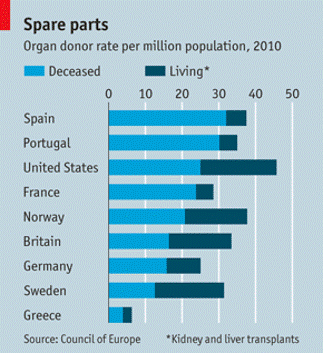Transplants
A transplant is the moving of an organ or tissue from one body to another, in order to replace it. The person that receives the organ or tissue is the recipient and the person that donates is the donor.
Transplants of organs and tissues.
Thanks to medical advances many organs and tissues can be transplanted nowadays. The following transplants are quite frequent: heart, kidney, liver, pancreas lung… and for tissues: bone marrow, skin, bones, eye cornea, blood…
Transplants of stem cells.
As our cells die, they are replaced by new ones. The cells within organisms that have the ability to divide and differentiate into various cell types are known as stem cells. There are two types of stem cells: embryonic, which can develop into any cell type and tissue specific, which are in certain tissue types and can only produce new cells of that particular tissue.
Problems with transplants
Even though nowadays transplants are quite a common procedure, there are still many things that can go wrong with this medical procedure. The most important problems that need a solution are the following:
· Keeping the organ that is going to be transplanted in optimum conditions.
· Different surgical complications.
· Rejection: It is the main problem after a transplant. Nowadays, we try to avoid this by using immunosuppressive drugs, which lower the recipient’s immune system defences. The problem is that a person with a lowered immune system cannot fight against infections.
A transplant is the moving of an organ or tissue from one body to another, in order to replace it. The person that receives the organ or tissue is the recipient and the person that donates is the donor.
Transplants of organs and tissues.
Thanks to medical advances many organs and tissues can be transplanted nowadays. The following transplants are quite frequent: heart, kidney, liver, pancreas lung… and for tissues: bone marrow, skin, bones, eye cornea, blood…
Transplants of stem cells.
As our cells die, they are replaced by new ones. The cells within organisms that have the ability to divide and differentiate into various cell types are known as stem cells. There are two types of stem cells: embryonic, which can develop into any cell type and tissue specific, which are in certain tissue types and can only produce new cells of that particular tissue.
Problems with transplants
Even though nowadays transplants are quite a common procedure, there are still many things that can go wrong with this medical procedure. The most important problems that need a solution are the following:
· Keeping the organ that is going to be transplanted in optimum conditions.
· Different surgical complications.
· Rejection: It is the main problem after a transplant. Nowadays, we try to avoid this by using immunosuppressive drugs, which lower the recipient’s immune system defences. The problem is that a person with a lowered immune system cannot fight against infections.










